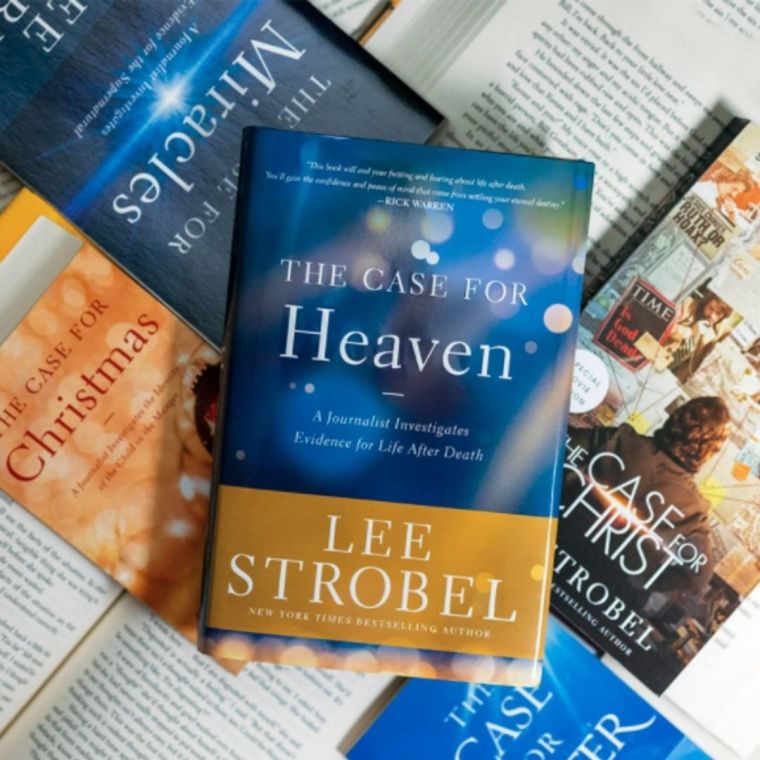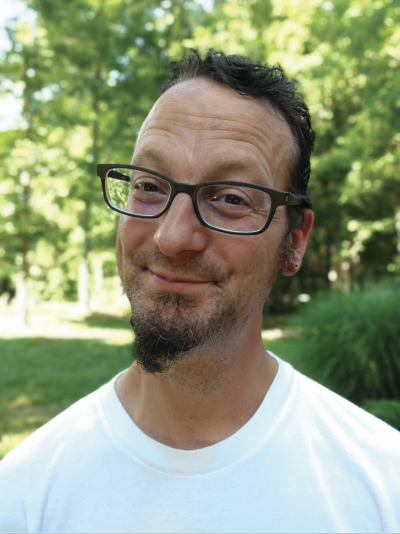Lee Strobel makes compelling case for life after death, Heaven and Hell in new book

It is often said that “everybody wants to go to Heaven but nobody wants to die.” Even Jesus, if He could have avoided it to save mankind, would have skipped facing death.
The night before His crucifixion, Jesus struggled. His struggle was so deep He sweated drops of blood as He prepared Himself for His execution on the cross.
“O my Father, if it be possible, let this cup pass from me: nevertheless not as I will, but as thou wilt,” He prayed.
It’s a prayer he would make three times.
Jesus eventually drank from the cup and died. But as he predicted in Scripture, death would not be His end. After three days, He rose from the grave and ascended to Heaven 40 days later.
In the last 19 months, death has been a recurring theme. In early October, deaths related to COVID-19 surpassed 5 million worldwide. And people have been dying at a clip. A Reuters analysis shows that while it took just over a year for the COVID-19 death toll to hit 2.5 million, it took less than eight months for the next 2.5 million to die.
If you’re in need of some inspiration in these dark times as the world faces what seems like unrelenting death, chances are, when you’re done reading bestselling Christian author and former investigative journalist Lee Strobel’s new book, The Case for Heaven: A Journalist Investigates Evidence for Life After Death, you’ll be inspired in a refreshing way by Jesus’ victory over the grave.
God’s promise of everlasting life to those who believe in His Son has long been the Bible’s biggest offer, but John 3:16 is probably a Scripture Christians have heard so many times, it’s taken for granted almost as much as a child takes the idea of death.
“For God so loved the world, that he gave his only begotten Son, that whosoever believeth in him should not perish, but have everlasting life,” it says.

In his book published last month by Zondervan, Strobel unpacks and illuminates the Bible’s promise of eternal life in a way that doesn’t make it seem like an urban legend. He uses research on near-death experiences, philosophy and religion to deliver a compelling presentation on the afterlife that make the concepts of Heaven, Hell and eternal life all plausible.
And if you read it as a Holy Spirit-filled Christian, chances are the presence of the eternal Holy Spirit will also bear witness to the truth of his empirical findings pointing to God’s promise. It perhaps will also be at this moment of spiritual acknowledgment where you will pause and ask yourself whether your priorities in life are aligned with walking in faith in God’s Word.
It was Strobel’s own near-death experience almost a decade ago that led the former atheist down the path of investigating life after death for this book.
“My wife found me unconscious. I was taken by ambulance to a hospital. I opened my eyes to an emergency room and the doctor said, you’re one step away from a coma, two steps away from dying. And then I fell unconscious again,” Strobel recalled in a recent interview with The Christian Post about his close brush with death.
“I had a condition called hyponatremia which is a drop in blood sodium level. For a while there, I hovered between life and death until doctors saved me. That was kind of a wake-up call for me. It’s a very clarifying experience to be hovering over that border between life and death. And that’s kind of the seed that ultimately resulted in this book because, as a Christian, I believe if I died, I would go to Heaven to be with God, but I also have a skeptical nature,” he said.
In the book, John Burke, Strobel’s colleague and near-death experience researcher and pastor of Gateway Church in Texas, who authored books like Imagine Heaven: Near-Death Experiences, God’s Promises, and the Exhilarating Future That Awaits You, explains how emerging research is increasingly pointing toward the reality of the afterlife as a logical conclusion.
“An increasing amount of research is being done. More than nine hundred articles have been published in scholarly journals. But many skeptical researchers have now concluded that NDEs give us a peek into the afterlife. None of the alternative explanations make as much logical sense as the straightforward conclusion that there really is life after death,” Burke explains.
Among the cases of near-death experience, Strobel highlights in his book is one reported by medical researcher, Kimberly Clark Sharpe, several years ago.
“She describes an out-of-body experience by a heart attack victim by the name of Maria. Maria died. She was flatlined in the hospital, and yet later Maria described how her consciousness drifted toward the ceiling and she observed the resuscitation efforts going on in her body,” Strobel said.
“Her soul, her consciousness floated outside the hospital, and when her spirit returned to her body, she said, ‘oh, by the way, on the hospital roof on the third-floor ledge, there’s a man’s tennis shoe and it’s left-footed. It’s dark blue with a wear mark over the little toe and the shoelace tucked under the heel.
“And they went and investigated it and sure enough, it was exactly as Maria had described it. So to me, this is good corroboration that her soul, her spirit, did separate from her body at the time of clinical death. And she was able to observe something she otherwise would not have observed, because the Bible teaches that at the time of death our soul does separate from our body,” Strobel said.
“The Apostle Paul said to be absent from the body is to be present with the Lord. Jesus told the repentant criminal on the cross, ‘today you will be with me in paradise.’ So at the time of death, our consciousness, our soul separates from our body and we go either to paradise to be with God or to Hades to be separated from God,” he continued. “The second phase of Heaven comes at the end of history where Jesus returns and we are reunited with our resurrected bodies and we go through final judgment, and then we spend eternity in a very physical Heaven or a very physical Hell.”
And yes, Hell. Readers will find it to be a very real place. Strobel dedicates two chapters to it in his book.
“Well, if Heaven is real, it implies that Hell is real too,” Strobel said. “The same kind of evidence points in both directions. I thought it was important to explore that topic. There’s a lot of aberrant teachings about Hell these days that are increasing in popularity in many churches, so I wanted to deal with those.”
There are aberrant teachings like the idea of annihilationism, which “is the belief that unbelievers will not experience an eternity of suffering in Hell but will instead be ‘extinguished’ after death,” he added.
“That’s a teaching that has gained popularity in recent years. I think it’s a secondary issue. I don’t think it’s necessarily heretical, but I don’t think it’s biblical. I think you could make a good case for it, but I don’t think that you could make a convincing case for it, so I try to show in the book how we fall short of being supported by Scripture,” Strobel said.
“The other popular opinion is universalism, that everyone ends up being saved. Then we’ll spend eternity with Adolf Hitler in Heaven, and I think that is a heretical position. I think it’s a dangerous position. I think it’s an erroneous position, so I try to demonstrate biblically in the book why that’s not true,” he explained. “I think it’s important that we look at the reality of the good news about Heaven — that it’s real. The bad news about Hell is that it’s real and one of the important truths that we need to understand.”
In his examination of life after death, Strobel highlighted another researcher who studied 93 patients who made verifiable observations while they were out of their physical bodies during their near-death experience. Some 92% of those observations were completely accurate. Another 6% were almost totally accurate.
“We even have cases where 21 blind people were studied, blind people who had near-death experiences. Nearly half of them blind since birth, and yet they say they could see during their near-death experience. They were able to describe things they would otherwise have not been able to describe. And then when they returned to their bodies, they could no longer see,” Strobel said.
While Strobel’s faith in God is unmissable in the book, it is the research and the conversational way in which he presents it that will likely make many readers keep turning the pages until the end.
“I try to show the evidence that I believe points toward Heaven. So in other words, I build it on things like near-death experiences which I believe show conclusively that our soul, our spirit, continues to live on after our clinical death. I base it on the resurrection of Jesus for which we have good evidence inside and outside the New Testament that show that Jesus not only claimed to be the Son of God, but He backed up that claim by returning from the dead,” Strobel said.
“Therefore, what He teaches about Heaven ought to be taken seriously because it shows that he created Heaven. He created the afterlife, and so I try not to just make dogmatic statements of Christian theology and hope that people believe them,” he added. “I try to build my case on evidence from inside and outside the Christian worldview to show the rationality of the Christian worldview. To show that it does make sense. To show that the evidence does point to that direction and to give people confidence that their faith in Christ is well placed.”
Courtesy of The Christian Post












